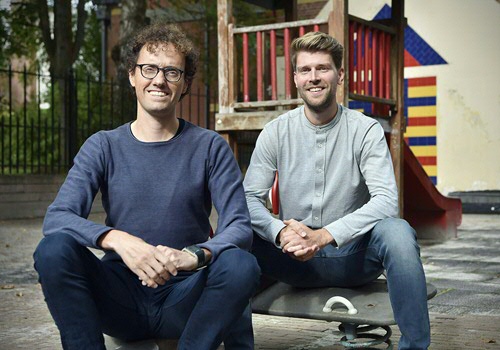From bully to handyman
Tidying up, assisting during a show, cleaning – these are just a few examples of the kinds of chores that pupils sometimes do at primary school. But the child enthusiastically introducing the school musical could quite easily be a former bully. Because, as it turns out, chores are a secret weapon in the fight against bullying.
Text: Eelco Salverda, Communication UG / Photo: Elmer Spaargaren
A need for status
The new anti-bullying programme, SterkWerk, is all about using responsibilities at school as a way to tackle bullying. Yet another anti-bullying programme? Prof. René Veenstra, who conducts a lot of research into bullying and is involved in the project, explains the benefits of SterkWerk. ‘We now know that bullying is a group process. You shouldn’t just focus on the victim or the perpetrator, because everyone is involved: the bullies’ helpers, the victims’ protectors, the silent majority. Some programmes are particularly good at this. But if the popular pupils are the ones doing the bullying, breaking through established patterns can be very difficult; the popular child has something to lose, their status. Through SterkWerk, we are trying to fulfil this need for status in a positive way, by giving children responsibilities at school. So, it’s a tool. It can be used to complement other programmes.’ Although this automatically conjures up images of classroom duties and children wearing high-visibility vests doing the weeding, this couldn’t be further from the truth.
Not a punishment
Rick Bloemberg initially trained to be a primary school teacher and then studied sociology at the University of Groningen. He developed teaching material for SterkWerk and has trained teachers. Bloemberg explains that popular bullies are now being offered alternatives to satisfy their need for status. ‘By performing a chore, they are given responsibility at school. We have already identified 100 possible responsibilities, ranging from answering the phone to keeping the corridors tidy, from organizing activities to supervising the playground.’ These are not punishments in disguise, intended to identify bullies. Everyone gets a task, not just the bullies. Children have a say in what they want to do, but teachers can also guide them and see what role would best suit the bully. Sometimes this leads to unexpected results.

Unexpected talents
Bloemberg: ‘Children are given a responsibility and that in itself creates a different dynamic in the classroom. And sometimes you discover that children have hidden talents and interests.’ Veenstra tells us about the example of a difficult pupil who was very fond of gardening at school. As a result, he was happier and his relationship with the teacher improved considerably. ‘And you also eliminate opportunities for bullying. For example, the five minutes before the break are often hectic and chaotic. If a pupil is given a task to do in those five minutes, they don’t have the chance to be a pain or to bully.’
Positivity as the norm
Doesn’t this approach also involve risks? Don’t bullies acquire even more status because of their important chores, making them feel even more untouchable? ‘That point often crops up in consultations with schools,’ agrees Veenstra. ‘But we have seen that it works if you have a positive approach to behaviour.’ Bloemberg adds: ‘I have also noticed a real difference. Children really throw themselves into their roles. They are enthusiastic about it, positive characteristics come to the fore. You teach them to behave differently.’
Problems on the street
Bullying is not limited to school; it also takes place on the street, in the playground, at the swimming pool. Aren’t anti-bullying programmes too focused on schools? ‘If an anti-bullying programme is widely supported in school, you will see that it also has an effect outside school,’ Veenstra refutes. ‘And I think it’s also the teacher’s job to respond to what’s happening outside the school gates. Tackling bullying goes beyond what happens in your own classroom.’

English of anti-bullying?
Are the programmes effective enough for schools to bother spending their time on them? Schools already have a lot more on their plate these days – English, science and technology, you name it. Veenstra: ‘The KiVa programme, for example, is a streamlined programme that only takes up 15 hours a year. And yes, the benefits are worth it. Many schools think its worth the investment. A safe class leads to better performances and it is also much healthier for the teacher. KiVa has been expanded from 60 schools to more than 350 schools. That says a lot.’
Remorse
Veenstra occasionally talks to the bullies. Do they show remorse? ‘It requires a lot of self-reflection to be able to talk about your actions, and children are often not yet able to do that. At primary school, there was a girl in my class who was a bit of an outsider and who had a hard time of it. Now I think: “we didn’t handle that well as a group back then”, but I didn’t realize it at the time. That’s why it’s important that schools have a sound programme, so that everyone can enjoy their time at school and so that teachers can call upon other children to support someone who is being bullied or who is lonely.’
More openness
Society is getting tougher and bullying is also taking place online. Anti-bullying programmes seem to be needed more than ever. Doesn’t Veenstra ever get disheartened? At this, he jumps up and his voice becomes more forceful: ‘No, not at all. There’s already a lot we can do. We now know that we have to tackle bullying in groups. We know that for some children, additional programmes are needed. And don’t forget: these days, everything has a way of rising to the surface, especially online. There’s much more transparency; you can’t get away with things anymore.’
The professor of bullying
Veenstra first came across research into how to tackle bullying as a young researcher, when he was studying young people’s social networks using the large population study, Trails. He successfully substantiated the assumption that bullying is a group process and became one of the world’s leading experts in the field. He is now known as “the professor of bullying” (‘which I consider to be an honorary title, especially when I’m referred to as a kind of protector of children.’) And Bloemberg? ‘Once I’d done my teacher training I wanted to learn more about group processes in the classroom, so I started studying sociology. I really like that combination of theory and practice. I think it’s important that schools don’t just focus on achievements. You also need to focus on social processes. We have a responsibility to create a better society.’
SterkWerk has been enthusiastically received by two pilot schools and is being evaluated on a larger scale at Dutch primary schools throughout the 2019-2020 academic year.
More information
- René Veenstra
- SterkWerk
| Last modified: | 21 June 2022 08.39 a.m. |
More news
-
17 March 2025
Liekuut | The high price of conflicts
According to Carsten de Dreu, Professor of Foundations of Cooperation and Social Organization at the University of Groningen, a lot can be learned from conflicts.
-
10 March 2025
Science for Society | Memory Lab for higher marks
Learning facts at school is something hardly anyone likes. The day before a test, pupils cram as many words or names as possible into their heads, only to hopefully remember them the next morning and then forget them again after the test.
-
05 March 2025
Women in Science
The UG celebrates International Women’s Day with a special photo series: Women in Science.
